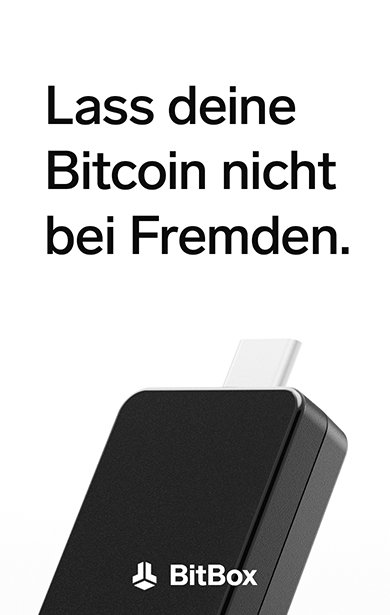Dear Members of the European Parliament, dear Members of Parliament from all European countries,
We are addressing you with this open letter to highlight opportunities and threats related to Bitcoin, blockchain and crypto because of the legal regulations that are planned or implemented that, we believe, do not benefit and potentially harm EU citizens. We observe that these regulations are primarily based on a lack of information. In this letter and an accompanying video, we want to provide basic information, so you can make good and intelligent decisions.
Let us ensure that we support regulation because innovation can develop much better in a defined environment, and planning certainty enables long-term prosperity for all. Therefore, we strongly urge you to regulate the crypto market based on informed, wise decisions for the benefit of all.
Bitcoin ≠ Crypto
First, we would like to point out that Bitcoin and crypto are two different worlds, even if using the word "cryptocurrencies" conveys that they are all the same. That is not the case! In all deliberations and regulations, a strict distinction must be made between Bitcoin and other blockchain products.
Most cryptocurrencies use blockchain as a storage function for recording transfers of value from one participant to another. However, not all blockchains are the same. The differences are as significant as the differences between a bicycle, a scooter, a car, a truck, a train, and an airplane, even though all of these are means of transportation. This fact is often not taken into account and leads to significant misunderstandings.
A blockchain is basically a slow database that stores transactions in what is called a data block. A mathematical function calculates a kind of serial number for each block. Because the serial number of one block is included in the next block, the data blocks are chained together. Hence the name blockchain.
Every change in an older block inevitably changes the serial number of the affected block. However, because this serial number is part of the calculation of the following block, the change continues through the entire chain, and all serial numbers change.
That is the basic principle of a blockchain. However, this is not the magic of the blockchain, although it is often assumed to be, leading to many misunderstandings.
Distribution and Difficulty
The immutable nature of historical data and transactions is because all data blocks and the entire blockchain are independently stored locally by thousands of computers.
Many tens of thousands of computers worldwide store a complete copy of the Bitcoin blockchain at all times. They compare each new data block with the local result of their independent calculations. If the self-calculated results differ, the delivered block is not added to the existing blockchain.
A blockchain is synchronized by these independent computers, storing the blockchain on its local computer after its local verification. This results in tens of thousands of copies. If not all of them come to the same conclusion, the new data block is not accepted. A suitable data block is added instead, on which the majority of computers can agree.
The core of a immutable and trustworthy blockchain thus consists, on the one hand, of the decentralized distribution on the participating computers and, on the other hand, of the degree of difficulty of the arithmetic operation to calculate the serial number of new data blocks and deliver them to the decentrally distributed computers.
The more challenging these computational operations, also referred to as mining, are, the more difficult any data manipulation becomes. The security of mining is therefore based on the pure computational effort on the one hand and on time required to calculate data blocks correctly on the other. Protection therefore costs time and requires computing power, while the mining computers must be supplied with electricity.
The faster a blockchain runs, the less secure it becomes. The quicker it is updated, the easier the computing task must be for the miners. Accordingly, the fastest blockchain is one in which the miners only have to solve a simple computational task and if this is all processed on a single computer. However, this blockchain is maximally insecure, and any simple database can do this task faster, better and cheaper.
In summary, it must be stated that both the wide distribution of computers storing the blockchain worldwide and the difficulty in calculating the required serial number of new data blocks are crucial for a blockchain's independence, immutability and stability.
Who can change the rules?
Another essential criterion is to analyze with what effort it is possible to change the conditions of a blockchain. Who can change the programming and therefore the protocol rules, and with what action? Suppose the programming of a blockchain is easy to change. In that case, the conditions to the difficulty of mining and the need for wide distribution can be easily changed. This, in turn, leads to control by a specific group of people.
The latter, in particular, is true to all blockchains except for the Bitcoin blockchain. Thus all of them, except Bitcoin, are inherently unstable because changes often could not be tested sufficiently. Moreover, and very critically, such changes are under the control of a few individuals who can change the terms at any time to suit their preferences.
Therefore, all blockchains, except Bitcoin, are FinTech products that can at best have the same status as exotic derivatives of the traditional financial industry.
So-called DeFi products or DeFi Chains pose particularly great dangers. These use smart contracts that execute automatic financial transactions once they have been started on the respective blockchain. These smart contracts are often nested within each other and, therefore, massively error-prone.
Those constructs, including the popular NFTs and stable coins, are comparable to the hazardous algorithmic computer trading systems of Wall Street, which can cause entire markets to explode or implode in a short time - to the detriment of the mass of investors and savers.
Although these alternative Blockchains and FinTech products are in most cases programmed with good intentions, as everyone knows, it is fundamentally impossible to program such automatisms error-free because that is fundamentally impossible with highly functional software. This results in loss risk for investors.
Further, potential programming errors harbour unmanageable risks, which typically emerge only after a long period of time. Again and again, such errors are also found and exploited by hackers.
Conceptual vulnerabilities
Finally, conceptual vulnerabilities also pose a massive threat to savers and investors. The recent billion-dollar loss just demonstrated this for investors in the LUNA token as well as the UST token and the problems with the Celsius Network.
Of course, the programming of most blockchains can be quickly changed to eradicate such flaws. The typical alternative blockchain can be transitioned to a new version or halted if necessary.
However, this is precisely where the requirements are diametrically opposed. An immutable, honest, and reliable blockchain, like the Bitcoin blockchain, must be sufficiently decentralized in all respects. The mining process must also have a significant degree of difficulty to ensure security.
But precisely these possibilities, to stop or change most blockchains, are putting oneself into a dependency on software houses that cannot be controlled. This affects all users, private, commercial, banks, institutions, the public sector, and even entire governments. They fall into dangerous dependencies when they use such non-secure blockchains.
A few software houses that supply application software for companies and public authorities already pose a latent danger and dependencies today. We must not allow parts of the financial system to be placed in the hands of a few.
Before taking such a step, it is imperative to understand blockchain technically and conceptually.
The flippant statement "Bitcoin is bad, and blockchain is good" testifies to fundamental gaps in understanding and endangers our freedom and democracy.
Bitcoin is not a software house, not a foundation, and no one in the world can change the software on the fly or even stop the blockchain. The Bitcoin blockchain's programming language cannot create highly complex derivatives and automated dependencies that can pose hidden dangers.
The decentralization is sufficiently large so that no manipulations or changes to the structure can be made lightly and at short notice. The difficulty of mining is significant enough that there is no danger to investors unless regulatory security gaps are artificially created due to a lack of information.
An Eldorado for Hackers
These regulatory security gaps include the potential direct or indirect compulsion to place Bitcoins in the custody of a custodian, as is currently being discussed in the EU under the "Travel Rule".
That leads to creating a new Eldorado for hackers who can steal investors' Bitcoins and steal and abuse personal data and content from newly emerging data pools.
Bitcoin must therefore be treated like cash, with appropriate exemption limits that, on the one hand, do not dictatorially restrict the individual's freedom and amount to an Orwellian surveillance tool, but at the same time serve to prevent money laundering in the interest of everyone's security. The discussed proposal to fully identify transaction partners from the first cent is unrealistic and extremely dangerous.
Such a direct or indirect requirement will stifle innovation and potentially push investors, innovators and entrepreneurs abroad, where conditions for the Bitcoin-industry are much more liberal. It also puts everyone under general suspicion and installs a surveillance mechanism that cannot be controlled. The freedom and security of the citizens of the European Union are recklessly put at risk.
Promote ecological mining
We are convinced that the future belongs to real decentralized blockchains with sufficient mining difficulty.
According to current knowledge, the sufficient mining difficulty can unfortunately only be guaranteed by the so-called proof of work procedure.
To guarantee peace and freedom for everyone, this procedure should be supported, for example, by promoting green mining. This also makes sense from an ecological perspective, since green mining also contributes to stabilizing the power grids if it is used appropriately. Appropriate concepts are available, and today well over 50% of mining plants are already powered by green electricity.
Unfortunately, the above facts do not serve as a basis for the current debate. A wise and forward-looking regulation can only be decided based on comprehensible scientific facts.
Therefore, it is imperative that all parties involved in the decision-making processes regarding Bitcoin, crypto and blockchain should seek sufficient high-quality information before making decisions that are detrimental to the citizens of the European Union and threaten peace and freedom.
Thank you.
Roman Reher and Joe Martin






